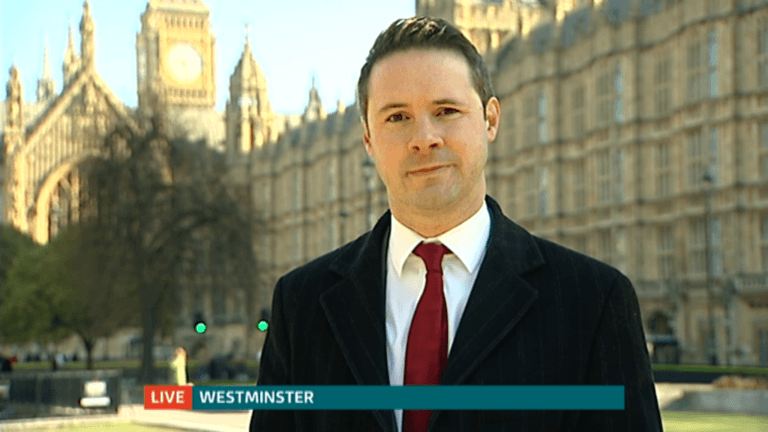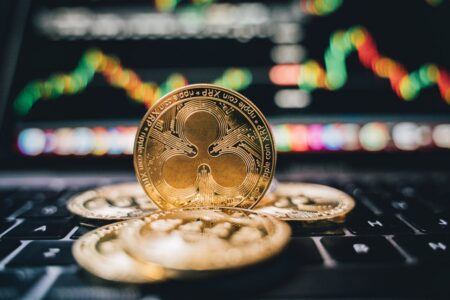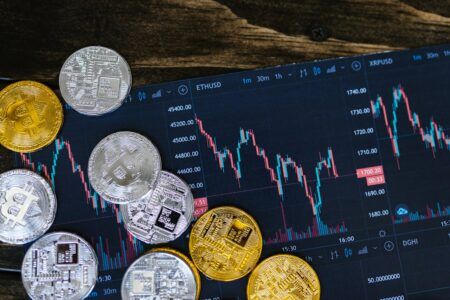Glen Goodman – a.k.a “The Shares Guy” – is a former Business Correspondent for the BBC and ITV. After quitting financial reporting when he started making more money trading than doing his job, Glen made headlines for his “Little Short” – netting £100,000 during the financial crisis of ’08-’09 after betting on a market crash.
Since then Glen has turned full-time to trading and cryptocurrencies and his investment education site The Shares Guy boasts one of the biggest crypto-trading pages on Facebook – with over 270,000 likes.
I caught up with Glen after his talk at the CryptoCompare MJAC London Blockchain Summit last month to discuss his views on the crypto industry, whether “the ICO bubble” is similar to last decade’s housing bubble, and to get his opinion on how blockchain and crypto reporting stack up against “mainstream” financial media.
Avi Rosten: How would you describe what you do?
Glen Goodman: I’m a private trader. I trade stocks, commodities, currencies, bonds and cryptocurrencies. I started trading as a hobby while working for many years as a TV Business Correspondent (for BBC News and ITV News here in the UK.) Trading turned from a hobby into a second career, until one day I realised I was making more money from trading than I was from my day-job. So I quit my job and started trading full-time.
AR: How did you originally get involved with crypto?
GG: After the collapse of the biggest crypto exchange Mt. Gox in 2014, the price of Bitcoin crashed by 85% and when the price began to recover, I started buying Bitcoin at around $300. I went to blockchain conferences and learned as much as I could about cryptocurrency. I was interested in the growth of Ethereum and other newer cryptos. When I started talking about Bitcoin and blockchain on my Facebook page, The Shares Guy, the popularity of the page went insane as the world caught Bitcoin fever and my followers spiralled into the hundreds of thousands, which was nice, but somewhat overwhelming at first.
AR: The cryptocurrency market as a whole seems to be going through a prolonged bearish phase, do you see things picking up?
GG: That’s the multi-trillion dollar question, so anyone who gets the answer right could become insanely rich.
Market timing is my speciality and I make my money from recognising the changing trends as they happen. There’s no need to try and guess beforehand when the turning point will come, merely to recognise it when it does arrive and start buying. I warned my followers on December 24th 2017 that the two-year upward trend was over and I sold my crypto holdings shortly afterwards. I suggested in January that we may be repeating the crash of 2014-15 and so far that does seem to be happening. I hope it doesn’t take two years to play out this time, but any huge price boom always takes quite a while to work its way out of the system before the market recovers. We have to work through all the FUD and reach a point of maximum despair & hopelessness where the last miserable chancers throw in the towel. There are some signs we’re nearly there. For example, the highly respected financial journalist Ambrose Evans-Pritchard just wrote an article declaring “the final…nail in the coffin” for cryptocurrency. I understand the technology and its future value, so articles like that don’t scare me, they just encourage me that we’re getting closer to rock bottom and hence to the turning point.
AR: You made a small fortune during the financial crisis ten years ago for shorting the market in a similar way to those in “The Big Short” – does the crypto market bear any resemblance to that bubble for you?
GG: Yes, bubbles can usually be recognised by delusion, people taking on a hopelessly optimistic viewpoint, even ignoring really negative news stories in the media.
In 2008, investors were behaving as if nothing bad was going on, stock markets were holding up way too well, even though we already knew about the sub-prime mortgage crisis. In late 2017, the price of Bitcoin carried on rocketing even as China banned Bitcoin exchanges and ICOs. The crypto trading bubble has burst now. If you check out Google Trends, you’ll see that searches for ‘cryptocurrency’ and ‘Bitcoin’ are back to the levels of a year ago, back before the world got really interested. So that bubble is well and truly over, it’s just a question of waiting for the recovery, which may be another crazy bubble or perhaps just a calm upward trend. Either way, there will be a lot of money to made trading crypto in the future. That’s why I’m writing a book, The Crypto Trader. Hopefully it will be published in time for people to learn how to trade properly before the next bull market is fully underway.
AR: Talking of bubbles…the CEO of Binance Labs recently said she wants the ICO Bubble to burst: is it going to burst soon?
GG: The crypto trading bubble may have burst but yes, the ICO bubble is still going strong. New projects are getting funded with millions of dollars of venture capital money and with millions of dollars of ICO money too. A lot of people are chasing the huge ICO profits people were making last year and in many cases they’re now ending up very disappointed. A lot of money is being wasted on pointless projects but – rather like the dotcom boom – some fantastic projects will also end up getting financed which is a useful byproduct of any irrational boom. I’m sure the ICO excitement will end in the usual tears eventually, but at least we’ll be left with a lot of solid, well-funded cryptos along with all the detritus.
AR: What do you make of comments from traditional finance figures such as Warren Buffett and Nouriel Roubini – when they compare bitcoin and cryptocurrencies to “turds” and “dementia”?
GG: Yeah, and Buffett called it “rat poison” too. Bottom line, he doesn’t know what he’s talking about.
Buffett is an investment genius with an unparalleled record, but by his own admission he only invests in what he understands, like Coke or Gillette. That’s why he missed out on the internet boom and even labelled his own failure to buy Amazon shares as “stupidity”. Roubini actually understands cryptocurrency pretty well, but not quite well enough. If you watch him debating Ethereum’s Joe Lubin back in May, you’ll see he has some scathing criticisms, but Lubin has answers all of them, except perhaps for “why’s it taking you so long to iron out the problems with blockchain scalability?” He has a point there, it is taking quite a while to get real-world usability sorted out, and that’s part of the reason why the general population has lost interest for the time being. If we had daily news stories about this or that incredible new blockchain app working in the real world, then it would keep the excitement going. But we don’t have that yet.
AR: As a former reporter for ITV news, what do you think about the way in which “mainstream media” represent and report about cryptocurrencies?
GG: There’s still far too much focus on criminals, hackers and manipulators. News editors always look for the emotive story, something that’s easy to understand and has shock value. Cryptocurrency provides plenty of that, so those are generally the stories the mainstream media run. Not much different from the early days of the internet when there used to be endless stories about the criminals and pornographers who dominated the web in the early days.
The rise of e-commerce was accompanied by terrifying stories about the dangers of using your credit card on the internet, which scared a lot of people away. So now crypto is often depicted as a ponzi scheme, a tulip bubble, a scam etc. I think it will be a real breakthrough when the media start to understand that crypto is so much more than just Bitcoin, so much more than just “currency” in general. So whenever I’m invited to talk on TV or radio, I try to make that point and tell them about the exciting possibilities.
AR: Conversely, do you think there is anything that crypto-media can learn from more established outlets?
GG: Absolutely. I think crypto media could do a lot more to explain things in a way ordinary people can understand. In TV News, I learnt a lot about how to boil a story down to its essential elements and help people grasp complex concepts in a few sentences.
AR: The crypto world can be quite daunting to outsiders, what would you say are the best resources for beginners to get up to speed?
GG: My book! (which I haven’t finished writing yet).
But honestly, I haven’t yet come across a decent book that would appeal to beginners. Cryptoassets by Chris Burniske & Jack Tatar is one of the best books on crypto, but it’s perhaps too complex for the general reader. It’s more useful for financial asset managers. On my website, thesharesguy.com, I’ve written basic primers on bitcoin & crypto so you could do worse than start there. Also the London School of Economics has a new Cryptocurrency Investment & Disruption online course. I’m one of the guest lecturers. That’s a really meaty course but it starts right at the beginning and will teach you an enormous amount.









